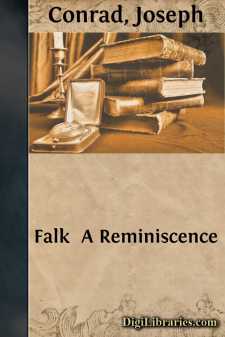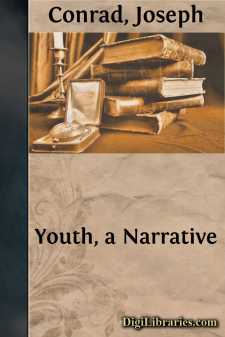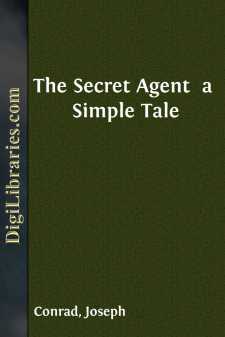Categories
- Antiques & Collectibles 13
- Architecture 36
- Art 48
- Bibles 22
- Biography & Autobiography 813
- Body, Mind & Spirit 142
- Business & Economics 28
- Children's Books 17
- Children's Fiction 14
- Computers 4
- Cooking 94
- Crafts & Hobbies 4
- Drama 346
- Education 46
- Family & Relationships 57
- Fiction 11829
- Games 19
- Gardening 17
- Health & Fitness 34
- History 1377
- House & Home 1
- Humor 147
- Juvenile Fiction 1873
- Juvenile Nonfiction 202
- Language Arts & Disciplines 88
- Law 16
- Literary Collections 686
- Literary Criticism 179
- Mathematics 13
- Medical 41
- Music 40
- Nature 179
- Non-Classifiable 1768
- Performing Arts 7
- Periodicals 1453
- Philosophy 64
- Photography 2
- Poetry 896
- Political Science 203
- Psychology 42
- Reference 154
- Religion 513
- Science 126
- Self-Help 84
- Social Science 81
- Sports & Recreation 34
- Study Aids 3
- Technology & Engineering 59
- Transportation 23
- Travel 463
- True Crime 29
Joseph Conrad
Joseph Conrad, born Józef Teodor Konrad Korzeniowski in 1857 in Poland, was a prominent British novelist known for his rich narrative style and profound exploration of the human psyche. His most famous works, such as "Heart of Darkness" and "Lord Jim," delve into themes of colonialism, morality, and existentialism. Despite English being his third language, Conrad's mastery of the language and innovative literary techniques have cemented his legacy as a central figure in modern literature.
Author's Books:
Sort by:
by:
Joseph Conrad
Young Powell and his Chance. I believe he had seen us out of the window coming off to dine in the dinghy of a fourteen-ton yawl belonging to Marlow my host and skipper. We helped the boy we had with us to haul the boat up on the landing-stage before we went up to the riverside inn, where we found our new acquaintance eating his dinner in dignified loneliness at the head of a long table, white and...
more...
by:
Joseph Conrad
CHAPTER ONE To yesterday and to to-day I say my polite "vaya usted con Dios." What are these days to me? But that far-off day of my romance, when from between the blue and white bales in Don Ramon's darkened storeroom, at Kingston, I saw the door open before the figure of an old man with the tired, long, white face, that day I am not likely to forget. I remember the chilly smell of the...
more...
by:
Joseph Conrad
Several of us, all more or less connected with the sea, were dining in a small river-hostelry not more than thirty miles from London, and less than twenty from that shallow and dangerous puddle to which our coasting men give the grandiose name of "German Ocean." And through the wide windows we had a view of the Thames; an enfilading view down the Lower Hope Reach. But the dinner was execrable,...
more...
by:
Joseph Conrad
YOUTH This could have occurred nowhere but in England, where men and sea interpenetrate, so to speak—the sea entering into the life of most men, and the men knowing something or everything about the sea, in the way of amusement, of travel, or of bread-winning. We were sitting round a mahogany table that reflected the bottle, the claret-glasses, and our faces as we leaned on our elbows. There was a...
more...
by:
Joseph Conrad
Chapter I. Books may be written in all sorts of places. Verbal inspiration may enter the berth of a mariner on board a ship frozen fast in a river in the middle of a town; and since saints are supposed to look benignantly on humble believers, I indulge in the pleasant fancy that the shade of old Flaubert—who imagined himself to be (amongst other things) a descendant of Vikings—might have hovered...
more...
by:
Joseph Conrad
KARAIN, A MEMORYIWe knew him in those unprotected days when we were content to hold in our hands our lives and our property. None of us, I believe, has any property now, and I hear that many, negligently, have lost their lives; but I am sure that the few who survive are not yet so dim-eyed as to miss in the befogged respectability of their newspapers the intelligence of various native risings in the...
more...
by:
Joseph Conrad
CHAPTER I Mr Verloc, going out in the morning, left his shop nominally in charge of his brother-in-law. It could be done, because there was very little business at any time, and practically none at all before the evening. Mr Verloc cared but little about his ostensible business. And, moreover, his wife was in charge of his brother-in-law. The shop was small, and so was the house. It was one of...
more...
by:
Joseph Conrad
PART I—THE DAMSEL CHAPTER ONE—YOUNG POWELL AND HIS CHANCE I believe he had seen us out of the window coming off to dine in the dinghy of a fourteen-ton yawl belonging to Marlow my host and skipper. We helped the boy we had with us to haul the boat up on the landing-stage before we went up to the riverside inn, where we found our new acquaintance eating his dinner in dignified loneliness at the...
more...
by:
Joseph Conrad
A FAMILIAR PREFACE As a general rule we do not want much encouragement to talk about ourselves; yet this little book is the result of a friendly suggestion, and even of a little friendly pressure. I defended myself with some spirit; but, with characteristic tenacity, the friendly voice insisted, "You know, you really must." It was not an argument, but I submitted at once. If one must! . . . You...
more...
by:
Joseph Conrad
CHAPTER I. “Kaspar! Makan!” The well-known shrill voice startled Almayer from his dream of splendid future into the unpleasant realities of the present hour. An unpleasant voice too. He had heard it for many years, and with every year he liked it less. No matter; there would be an end to all this soon. He shuffled uneasily, but took no further notice of the call. Leaning with both his...
more...











